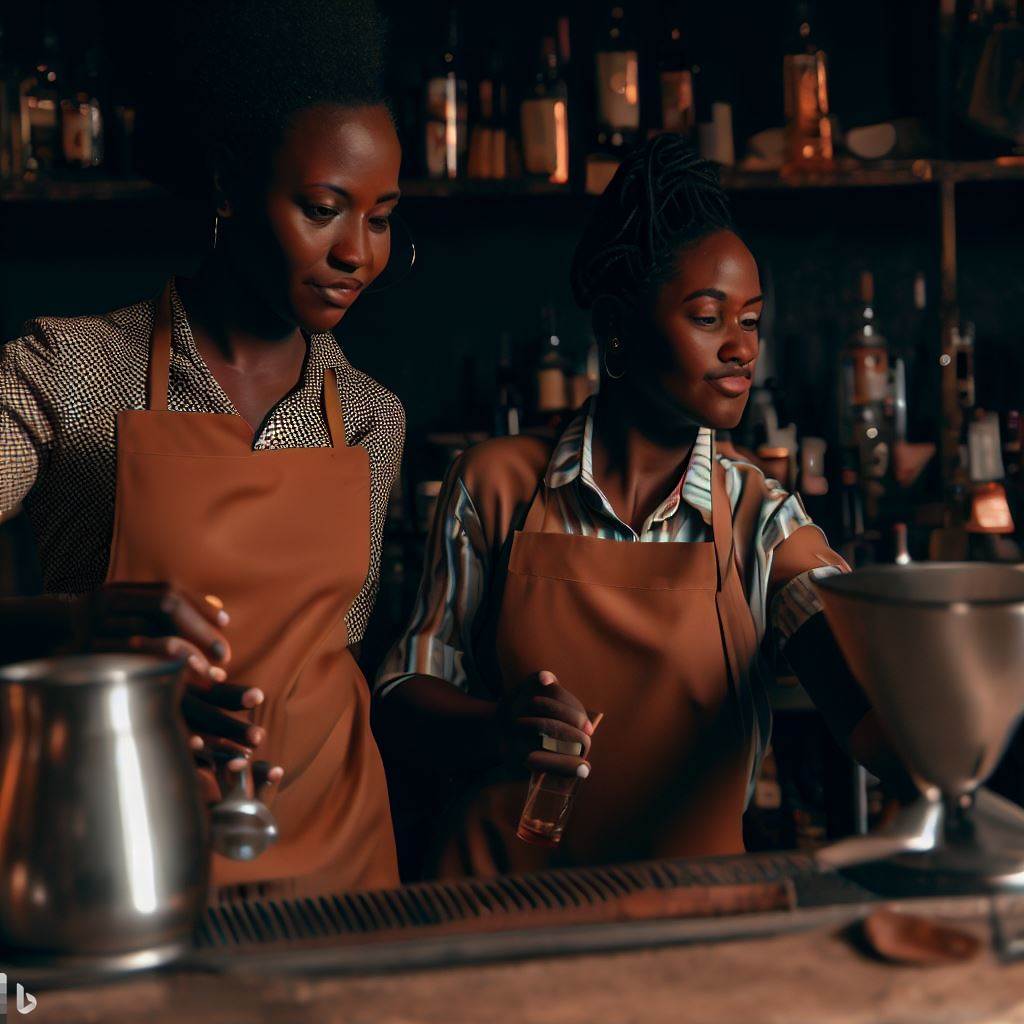Introduction
In Nigeria’s patriarchal society, women in the bartending industry confront formidable challenges, yet they’re shattering stereotypes and establishing their presence in this traditionally male-dominated realm.
Firstly, it’s essential to recognize the pervasive gender bias that confronts women in bartending.
Traditional norms discourage women from pursuing these roles, often deeming them more suitable for men.
Additionally, the physical demands of bartending, like heavy lifting and long hours, are considered hindrances.
Sexism and discrimination persist in many bars, with women often overlooked for promotions and leadership positions, creating a hostile environment.
Moreover, aspiring female bartenders struggle to access proper training and mentorship opportunities, further hindering their entry and success in the field.
Nevertheless, Nigerian women are defying stereotypes, showcasing their competence and skills, and challenging societal norms.
To support women in bartending, fostering gender equality and inclusivity is imperative.
Implementing policies for equal employment opportunities and fair treatment, along with tailored training and mentorship programs for women, can help break down barriers.
In fact, Nigerian women face numerous obstacles in bartending due to gender bias and discrimination. Yet, they persist in reshaping the narrative and claiming their rightful place in the industry.
Historical Perspective
In Nigeria, the traditional roles of women were centered around marriage, childbearing, and caring for the home.
Over the years, these roles have evolved as more women gained access to education and employment opportunities.
Cultural and societal factors have played a significant role in the underrepresentation of women in bartending.
A. Gender Stereotypes
- Traditional gender stereotypes have dictated that women are better suited for nurturing roles rather than a demanding job like bartending.
- These stereotypes have limited the opportunities available to women and discouraged them from entering the industry.
B. Cultural Norms
- In Nigeria, there is a preference for male-dominated professions, which has resulted in a lack of encouragement for women to pursue careers in bartending.
- Cultural beliefs that view bartending as a “men’s job” have further perpetuated the underrepresentation of women in the field.
C. Lack of Support
- Women often face challenges in accessing the necessary training and resources to excel in bartending.
- There is a lack of mentorship and support systems in place for women entering the industry, making it difficult for them to navigate and succeed.
D. Glass Ceiling Effect
- Discrimination and biases within the bartending industry often limit women’s advancement opportunities.
- Women face barriers in obtaining leadership positions and are often overlooked for promotions and higher-paying roles.
E. Social Stigma
- Bartending, being an occupation that involves serving alcoholic beverages, is sometimes associated with negative stereotypes.
- Women may face judgment and societal criticism for choosing a profession that is seen as unconventional or inappropriate.
Despite these challenges, women in Nigeria are breaking barriers in bartending.
They are challenging societal expectations, advocating for their rights, and pursuing their passion for mixology.
Organizations and platforms are emerging to provide training, mentorship, and networking opportunities specifically for women bartenders.
By celebrating and promoting their achievements, it encourages other women to enter and thrive in the industry.
Women bartenders are becoming influential figures, challenging stereotypes, and redefining gender roles in Nigeria.
As these changes continue to take place, it is essential to recognize the progress made while also acknowledging the work still to be done.
Through continued support, awareness, and equal opportunities, women in bartending will continue to break barriers and contribute to the growth of Nigeria’s hospitality industry.
Emergence of Female Bartenders
Over the past few years, Nigeria has witnessed a significant increase in the number of female bartenders.
This shift can be attributed to various factors that have contributed to the changing dynamics of the bartending industry in the country.
A. Factors that have contributed to the increase in female bartenders
- Changing societal norms: Nigerian society has gradually become more accepting of women working in traditionally male-dominated fields.
- Increase in job opportunities: More bars, clubs, and restaurants have opened up, creating more employment opportunities for individuals interested in bartending.
- Embracing gender equality: The recognition of women’s rights and the push for gender equality have played a significant role in encouraging women to pursue careers in bartending.
- Desire for financial independence: Many women in Nigeria aspire to be financially independent, and bartending has emerged as a lucrative career option.
- Superior customer service: Female bartenders are often perceived as being more attentive, empathetic, and patient, leading to better customer experiences.
Furthermore, globalization and exposure to international trends have had a profound impact on the mindset towards women in bartending.
B. Influence of globalization and exposure to international trends
- Changing perception: As Nigeria becomes more interconnected with the global community, attitudes towards women in bartending have become more progressive.
- International success stories: Success stories of female bartenders from around the world have inspired Nigerian women to pursue careers in bartending.
- Training and education: Access to international training programs and educational resources has facilitated skill development among aspiring female bartenders.
- Representation in media: Increased representation of women bartenders in mainstream media has helped break down gender stereotypes and encouraged more women to enter the field.
- Opportunities for travel: Bartending offers opportunities for travel and exposure to different cultures, appealing to adventurous Nigerian women.
Overall, the emergence of female bartenders in Nigeria can be attributed to a combination of changing societal norms, increased job opportunities, the pursuit of financial independence, and the influence of globalization.
The bartending industry in Nigeria is gradually becoming more inclusive and diverse, breaking barriers previously limiting women’s participation.
Read: Earnings Insight: Bartender Salaries in Nigeria

Breaking Stereotypes
A. Examining the stereotypes and perceptions associated with women in the bartending industry
- Assertive and Dominant: Society often believes that bartending is a male-dominated profession, where women are seen as submissive servers rather than skilled professionals.
- Limited Abilities: There is a prevailing stereotype that women lack the physical strength and endurance required to excel in bartending, especially in fast-paced environments.
- Judgment Based on Appearance: Unfortunately, the industry sometimes emphasizes women’s physical attractiveness, leading to the perception that their looks are more important than their skills.
- Limited Opportunities for Advancement: Women face a glass ceiling in bartending, with limited access to managerial positions or ownership due to a perceived lack of leadership capabilities.
B. Successful stories of women who have defied stereotypes and achieved recognition in the field
- Ama Peters: Ama Peters, a highly skilled bartender, has successfully challenged gender stereotypes in Nigeria’s bartending scene. Despite facing initial skepticism, she has earned respect through her unparalleled mixology skills and dedication to her craft.
- Adaora Iwuanyanwu: Adaora Iwuanyanwu, a trailblazer in the industry, has shattered the glass ceiling by becoming the first female African bartender to win prestigious international cocktail competitions. Her achievements have inspired many aspiring female bartenders to pursue their dreams.
- Funke Oyedele: Funke Oyedele’s perseverance and talent have propelled her to become a renowned mixologist in Nigeria. She has showcased her skills at numerous high-profile events and has become a symbol of empowerment for women in the bartending industry.
- Temitope Tella: Temitope Tella, a passionate bartender, has made a name for herself by creating unique and innovative cocktails. Her dedication, creativity, and professionalism have earned her recognition and respect from both colleagues and customers.
In short, women in bartending face unfounded stereotypes and misconceptions. However, by defying these notions, numerous talented women have achieved tremendous success in the industry.
It is crucial to appreciate their skills, passion, and commitment, rather than limiting them based on outdated perceptions.
As more women break barriers and gain recognition, they serve as beacons of inspiration for aspiring female bartenders in Nigeria and beyond.
Together, we can create a more inclusive and diverse bartending industry, where talent knows no gender limitations.
Read: The Art of Mixology: Bartending Trends in Nigeria
Challenges and Opportunities
A. Identifying Obstacles Faced by Women in Bartending:
- Discrimination: Women often encounter discrimination when seeking bartending roles, with some employers favoring male candidates.
- Lack of Opportunities: Limited job openings in bartending for women, especially in upscale or high-end establishments.
- Gender Biases: Preconceived notions that women are less capable bartenders can hinder their progress.
- Safety Concerns: Safety issues can arise when working late hours in bars or clubs, which may deter some women.
- Cultural Stereotypes: Traditional gender roles in Nigerian society can influence perceptions of women in bartending.
B. Initiatives to Overcome Challenges and Foster Inclusivity:
- Training and Education: Offer bartending courses and workshops tailored to women to enhance their skills.
- Equal Employment Opportunities: Encourage bars and restaurants to adopt equal hiring policies.
- Awareness Campaigns: Raise awareness about the talent and potential of women in bartending.
- Mentorship Programs: Create mentorship programs that connect experienced female bartenders with aspiring ones.
- Safe Working Conditions: Advocate for improved safety measures and transportation options for female bartenders working late shifts.
- Networking Events: Organize events that facilitate networking and collaboration among women in the bartending industry.
- Supportive Communities: Establish online forums and support groups where women can share experiences and advice.
- Legal Protections: Lobby for legal protections against gender-based discrimination in the workplace.
- Recognition and Awards: Recognize outstanding female bartenders through awards and competitions.
- Leading by Example: Encourage successful women bartenders to serve as role models and inspire others.
In Nigeria, as in many other places, women in bartending face challenges rooted in societal norms and biases.
However, with concerted efforts, these obstacles can be overcome.
By promoting inclusivity, offering opportunities, and changing perceptions, the bartending industry in Nigeria can benefit from the diverse talents and perspectives that women bring.
Together, we can break down these barriers and create a more equitable and vibrant bartending community.
Read: Legal Requirements for Bartending in Nigeria
Promoting Gender Equality in the Bartending Industry
Gender equality is essential in the bartending industry, not only for societal progress but also for business success.
The inclusion of women behind the bar breaks barriers and brings numerous benefits to both individuals and establishments.
Here, we will explore the importance of gender equality in bartending and discuss the positive impact it can have on business success.
A. Importance of Gender Equality in the Bartending Industry
- Breaking stereotypes: Women in bartending challenge traditional gender roles, showing that anyone can excel in this industry.
- Promoting diversity: Gender equality ensures representation and creates a more inclusive and welcoming environment for patrons.
- Equal opportunities: Women deserve the same opportunities for advancement and growth as their male counterparts.
- Eliminating discrimination: Gender equality helps eradicate discrimination and create a fair work environment.
- Encouraging innovation: Diverse perspectives inspire creativity and innovation, leading to unique drink creations and customer experiences.
B. Benefits of Having a Diverse Workforce
- Improved customer satisfaction: Diverse bartending teams cater to a wider range of customers, creating a more personalized and enjoyable experience.
- Enhanced decision-making: Different viewpoints and experiences lead to better decision-making processes and more well-rounded solutions.
- Increased employee morale: A diverse workforce promotes a sense of belonging, mutual respect, and collaboration among team members.
- Boosted creativity: Unique backgrounds and perspectives foster a creative atmosphere, pushing the boundaries of mixology.
- Expanded customer base: Gender equality attracts diverse clientele who appreciate establishments that prioritize inclusivity.
- Better profit margins: Research shows that companies with diverse teams tend to outperform their homogeneous counterparts.
Embracing gender equality in the bartending industry is not just a moral imperative but also a strategic move for long-term success.
By providing equal opportunities, breaking stereotypes, and fostering an inclusive environment, businesses can thrive in today’s diverse world.
Women bartenders, much like their male counterparts, bring unique talents, skills, and perspectives.
They have the ability to connect with customers, contribute fresh ideas, and make a positive impact on the overall success of a bar or restaurant.
Furthermore, gender equality sends a powerful message to society. As more women break through barriers in bartending and excel in their careers, they become role models for aspiring professionals.
This ripple effect encourages more women to enter the industry and shatters glass ceilings across various sectors.
In general, promoting gender equality in the bartending industry is crucial for breaking barriers and fostering success.
By embracing diversity and providing equal opportunities, the industry can benefit from enhanced creativity, improved customer satisfaction, and increased profitability.
Together, we can create an inclusive and thriving bartending community in Nigeria.
Read: Bartender Career Paths: Opportunities in Nigeria
Learn More: How COVID-19 Impacted Medical Secretaries in Nigeria
Supporting Women in Bartending
A. Highlighting Organizations and Initiatives
In recent years, there has been a significant push to support and empower women in the bartending industry.
Numerous organizations and initiatives have been established to break barriers and provide resources for women aspiring to enter the profession.
Here are some noteworthy examples:
- Ladies of American Distilleries (LOAD): LOAD is an organization that aims to create a supportive network for women working in the distillery and bartending industry. Through mentorship programs, workshops, and events, LOAD encourages women to thrive in this traditionally male-dominated field.
- Women of the Vine & Spirits (WOTVS): WOTVS is a global organization that promotes gender equality and empowerment in the alcohol beverage industry. They offer educational resources, networking opportunities, and advocacy initiatives to help women succeed in various roles, including bartending.
- Speed Rack: Speed Rack is a competition that showcases and celebrates the talents of female bartenders. This initiative not only highlights their skills but also provides a platform for networking and professional development. It also raises funds for breast cancer research.
- Bar Smarts: Bar Smarts is an educational program tailored for bartenders. They offer a Bar Smarts Advanced scholarship specifically for women looking to excel in the industry. This scholarship covers the course expenses and helps women enhance their knowledge and skills.
B. Practical Tips for Women Aspiring to Enter Bartending
- Gain Knowledge and Skills: Invest in learning about different spirits, cocktail recipes, and bartending techniques. Attend workshops, seminars, and online courses to expand your knowledge base.
- Seek Mentorship: Find a mentor who can guide you through your journey in bartending. Look for experienced professionals who can provide valuable advice and help you navigate the challenges of the industry.
- Network and Build Connections: Attend industry events, join professional associations, and connect with other bartenders. Building a network of like-minded individuals can open doors to job opportunities and provide support.
- Work on Communication Skills: Effective communication is crucial in bartending. Practice your listening and communication skills to ensure excellent customer service and create a welcoming atmosphere for patrons.
- Embrace Creativity: Experiment with different flavors, ingredients, and techniques to create unique and memorable cocktails. Creativity can set you apart and make a lasting impression on customers.
- Be Confident and Assertive: In a male-dominated industry, it is important to be confident in your abilities and assertive in pursuing opportunities. Believe in yourself and don’t hesitate to showcase your skills and ideas.
- Stay Updated on Industry Trends: Keep up with the latest trends and innovations in the bartending world. This will not only help you stay relevant but also allow you to offer unique experiences to customers.
- Embrace Continuous Learning: The bartending industry is constantly evolving. Be open to learning new techniques, trying new ingredients, and exploring emerging trends to stay ahead of the curve.
Supporting women in bartending is crucial for creating a more inclusive and diverse industry.
By highlighting organizations and initiatives that promote empowerment and providing practical tips for aspiring bartenders, we can break barriers and inspire more women to pursue their passion in bartending.
Let’s continue to support and uplift each other in this dynamic and rewarding profession.
Conclusion
Women in bartending in Nigeria have made significant progress in breaking barriers and achieving success.
However, it is important to recognize that there is still work to be done in creating a more inclusive and diverse industry.
Continued efforts are needed to dismantle gender stereotypes and provide equal opportunities for all aspiring bartenders, regardless of gender.
By doing so, we can ensure a vibrant and flourishing bartending industry that embraces diversity and empowers women.
Let us continue to champion gender equality and support the growth of women bartenders in Nigeria!




